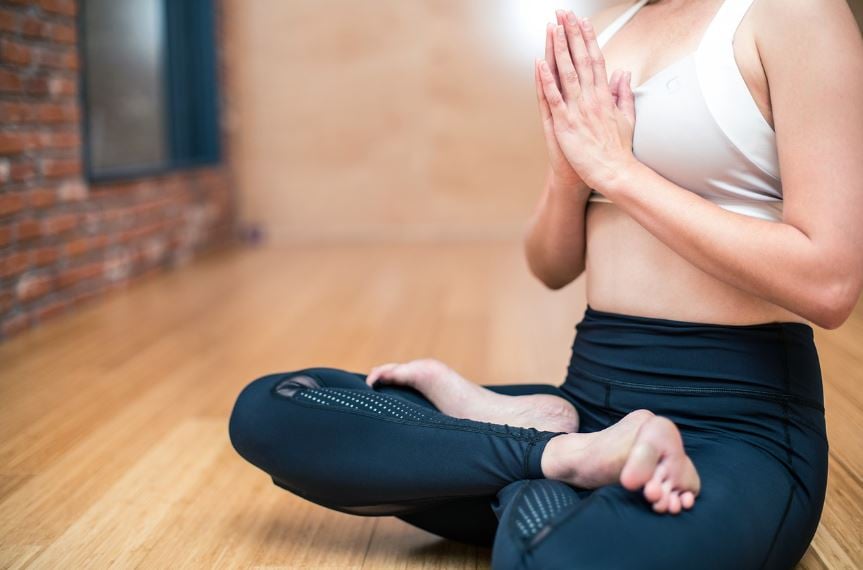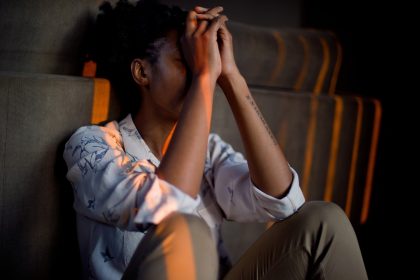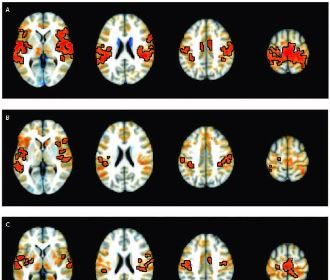Try Yoga to Reduce Stress and Improve Health

WASHINGTON — In today’s world, we’re busier and more worried than ever. Work is demanding, new health crises are arising and we have a constant influx of information about everything on our phones.
Our brains are overloaded and we never stop thinking. When you have a never-ending to-do list, you get accustomed to running around constantly and living with stress.
Hearing that you should “reduce stress” may only make you more stressed. Trying out a yoga class may not fit neatly into your packed schedule. But do you have two minutes to sit down and breathe? What if one single minute of mindfulness could make a difference?
How Stress Can Harm Your Health
There are two types of stress to consider: acute and chronic. Acute stress is normal and arises during a challenging situation. Your heart rate and blood pressure may increase temporarily. Chronic stress results from being stressed constantly over a long period, directly impacting your physical and mental health.
For over 50 years, studies have shown that chronic stress causes inflammation that leads to health problems. Chronic stress affects your brain and impacts several systems in your body: your nervous system, cardiovascular system, immune system, digestive system, and metabolic system. Research links chronic stress to cardiovascular diseases, diabetes, autoimmune disorders, and mental health disorders, including anxiety and depression.
The Mayo Clinic states chronic stress can also increase your risk of heart disease, high blood pressure, atherosclerosis, heart attack and stroke. It can also lead to cognitive issues, headaches, digestive problems and muscle tension.
How to Reduce Stress
Stress is a natural reaction to difficult situations. You may have a highly demanding job in the government or national organization. Outside work, you may also have a busy home life caring for your children or family.
As variables change, more stressful times may arise. You can’t change these situations, but you can take steps to care for yourself and reduce stress in your body.
The CDC recommends several ways to reduce stress.
- Eat a healthy diet.
- Sleep well.
- Exercise regularly.
- Sit less and move more.
- Limit alcohol and avoid smoking.
- Stretch, breathe, and meditate.
The Eight Limbs of Yoga
The word “yoga” may bring to mind an exercise class, flexibility and advanced poses. Yoga is an ancient spiritual practice from India that may be over 5,000 years old and initially did not focus on physical poses. Yoga was first brought to the United States in 1893, and the physical practice (asana) arrived later in 1919.
Yoga contains “eight limbs,” a philosophy and a way of living. While all eight limbs are important, here we will break down the three limbs of yoga that you can use to help reduce stress.
Physical Yoga Practice – Asana
Asana is a Sanskrit word meaning posture. Practicing yoga poses can help you build strength and flexibility. Holding stretches can improve blood flow and reduce stress.
Whether you hold a pose or move from one pose to the next, link your breathing with your movements. Focusing on inhaling and exhaling as you move your body helps you pay attention to the present moment.
You may take a yoga class as a workout, but you shouldn’t push yourself to achieve advanced poses. Paying attention to your breath and movements is all it takes to reduce stress safely.
A review of studies showed that regularly practicing yoga asanas can calm your nervous system and reduce stress.
Breath Control – Pranayama
Pranayama is a Sanskrit word meaning breath control. Our breath is what connects our bodies to the world around us.
Take a moment right now to notice your breathing. Some people take shallow breaths high in their chests, especially when stressed or anxious. Try to breathe a little deeper by expanding your stomach as you take a long inhale and then slowly exhale as you relax your stomach.
Breathwork allows you to slow down and try different styles of breathing. Taking deep diaphragmatic breaths can help your brain, nervous system and entire body relax. There are different styles of breathwork where you inhale, hold, and exhale for various lengths of time. They all involve slowing down and breathing more deeply.
Multiple studies show that slow, diaphragmatic breathing can help promote relaxation, reduce stress, and improve well-being, mental and physical health.
Meditation – Dhyana
Meditation, or dhyana, may seem intimidating. A common misconception is that you must completely clear your mind to meditate. When you are stressed and busy, it seems impossible to stop thinking.
There are many different types of meditation. Mindfulness meditation is the practice of paying attention to your thoughts and the present moment. You don’t need to stop thinking to meditate, but you can notice your thoughts and let them be there. You can also bring in breathwork and physical yoga poses to help you get into a meditative state.
Many studies show that practicing mindfulness and meditation can help you reduce stress and manage symptoms of anxiety and depression.
The Best Yoga Poses to Reduce Stress
You can try a few yoga poses, breathing, and meditation on your own or by taking a class. You can use a YouTube video, follow a guided meditation, or try various apps for breathwork.
Here are a few of the best yoga poses to bring together all three stress-reducing aspects of yoga.
Easy Pose – Sukhasana
Easy Pose refers to simply sitting down on the floor. You can cross your legs, sit up tall, and rest your hands on your knees. You can elevate your seat on yoga blocks, a pillow, or a folded-up blanket. You can also lean against a wall to support your back.
You can practice a few minutes of breathwork or meditation in this pose. You can also sit in a chair for more support if it’s more comfortable for you.
Corpse Pose – Savasana
If you’ve ever taken a yoga class, you’re familiar with the final resting pose called Savasana. This one is easy to do on your own. Simply lay on your back on a mat with your arms by your sides. Close your eyes and try to relax.
If you find your mind wandering, take deep breaths or try meditation. Before sleeping at night, put your phone away and practice savasana in your bed. Taking a few deep breaths can help you relax and reduce stress to improve your sleep.
Seated Forward Fold – Paschimottanasana
Seated forward fold is an excellent stretch for your hamstrings, calves and back. Sit up tall on the floor with your legs stretched out in front of you and keep a slight bend in your knees. Hinge at your hips to fold your upper body down and reach your hands towards your feet.
If you have tight hamstrings, use a yoga strap or long band to loop around your feet. Keep your knees bent to avoid overstretching.
You can also sit on a pillow or folded blanket for more support. Breathing deeply in this pose can reduce stress as you stretch your lower body.
Breathe Deeply and Relax
Chronic stress directly impacts your physical and mental health. Research shows that stress-related inflammation can lead to chronic diseases. Eating a healthy diet, sleeping well, exercising regularly, breathing and meditation can help reduce stress.
There are eight components of yoga, three of which can help you reduce chronic stress and improve your health. Practice yoga poses, breath control, and meditation to help you relax, be present, and cope with stressful times.
You can reach us at [email protected] and follow us on Facebook and X

























